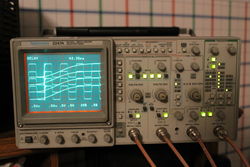2247A: Difference between revisions
No edit summary |
No edit summary |
||
| Line 17: | Line 17: | ||
(It is unknown if a 2247 non-A model was ever built.) | (It is unknown if a 2247 non-A model was ever built.) | ||
The 2247A is identical to the 2246 but with a counter/timer (C/T) integrated into the trigger system to provide many automated counting and timing measurements with high accuracy. | The 2247A is identical to the 2246 but with a counter/timer (C/T) integrated into the trigger system to provide many automated counting and timing measurements with high accuracy, along with an AUTO SETUP button to help produce a useful waveform display based on the voltage and time characteristics of the input signal. | ||
Channels 1-2 are fully-functional, whereas 3-4 are limited in both deflection factor and coupling, as they are intended mainly for digital and trigger signals. | Channels 1-2 are fully-functional, whereas 3-4 are limited in both deflection factor and coupling, as they are intended mainly for digital and trigger signals. | ||
Revision as of 00:06, 4 June 2019
The Tektronix 2247A is a 100 MHz four-channel analog oscilloscope with a built-in 200 MHz counter/timer. (It is unknown if a 2247 non-A model was ever built.)
The 2247A is identical to the 2246 but with a counter/timer (C/T) integrated into the trigger system to provide many automated counting and timing measurements with high accuracy, along with an AUTO SETUP button to help produce a useful waveform display based on the voltage and time characteristics of the input signal.
Channels 1-2 are fully-functional, whereas 3-4 are limited in both deflection factor and coupling, as they are intended mainly for digital and trigger signals.
The 2247A also has advanced features like automatic setup, tracking cursors, integrated voltmeter, and can store/recall of 20 front panel setups.
Key Specifications
| Bandwidth | 100 MHz |
|---|---|
| Deflection | CH 1, CH 2: 2 mV/div to 5 V/div in 1-2-5 seq; CH 3, CH 4: 0.1 V/div and 0.5 V/div, all ±2%; BW Limit: 20 MHz ±15% |
| Vertical Operating Modes | CH1,2,3,4, CH2 Invert, Add, Alt, Chop (625 kHz) |
| Input Impedance | 1 MΩ ±1.0% // 20 pF ±1 pF |
| Maximum Input Voltage | 400 V (DC + peak AC) or 800 V (p-p ac at ≤ 10 kHz) |
| Sweep Speeds | A Time Base: 0.5 s/div to 20 ns/div in 1-2-5 seq; B Time Base: 5 ms/div to 20 ns/div in 1-2-5 seq (×10 magnifier to 2 ns/div) |
| Trigger | DC, Noise Reject, HF Reject, LF Reject, AC, TV Line, TV Field |
| Trigger Modes | A Mode: Auto Level, Auto, Norm, TV Line, TV Field, Single Seq. B Mode: Runs After Delay, Auto Level, Norm, TV Line (From A Source) |
| Trigger Source A & B | Vert, CH1, 2, 3, 4, Line |
| Voltmeter | DC, +Peak, −Peak, PK-PK, Gated Volts, Smart Tracking Cursors: Volts, Gnd, Trigger Lvl |
| Counter/Timer | Freq, Period, Width, Totalize, Freq Ratio, Sec, 1/Sec, Phase, Rise/Fall Time, Prop Delay Time |
| Cursors | Time, 1/Time, Delta Time, 1/Delta Time, Delta Phase, Volts |
| Interface | Ext Counter/Timer Base Input connector; Ext Z-Axis Input connector |
| Probes | Two P6109 100 MHz ×10 probes, BNC connector with a readout pin |
| Power | 100 W max, 90 − 250 VAC, 48 − 445 Hz |
Pictures
-
Front
-
-
-




